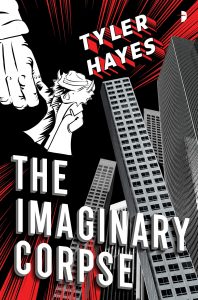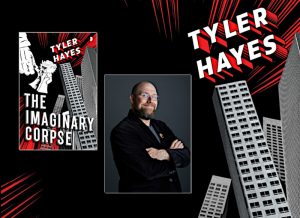Author Spotlight: TYLER HAYES
Joining us for today’s Author Spotlight is Tyler Hayes!
Tyler is a science fiction and fantasy writer from Northern California, and a Social Justice Bard specializing in the College of Comfort. He writes stories he hopes will show people that not only are they not alone in this terrifying world, but we might just make things better. His fiction has appeared in anthologies from Alliteration Ink, Graveside Tales, and Aetherwatch. Tyler’s debut novel, The Imaginary Corpse, is coming from Angry Robot Books in fall 2019.
Welcome to the Hive, Tyler. Let’s start small: tell us about a great book you’ve read recently!
This is How You Lose the Time War, by Amal El-Mohtar and Max Gladstone. (I’m sure you’re getting that a lot lately!) It’s an epistolary novel consisting of letters between two agents of rival time-traveling armies/empires, each working to ensure the timeline comes to pass in which their faction is the dominant one. The letters start out as a mocking exchange between two enemies, and become something entirely else. This book is an uncut, pure dose of Extremely My Jam: big, weird ideas that are never afraid to keep going bigger, but which are also used to help frame a more intimate, emotional story. It’s one of my top twenty books of all time, and the more I think about it the more I wonder if isn’t in even in my top ten.
Okay, time to escalate things: reality warps and you suddenly find yourself leading a D&D-style party through a monster-infested dungeon. What character class are you, and what’s your weapon of choice?
Wow, you saw me coming, didn’t you?
I’m a bard of the College of Valor, which means really my weapon of choice is the Vicious Mockery cantrip, but you can catch me wielding a battleaxe in one hand and a shield in the other in between shouting and drumming my compatriots to victory.
(I won’t lie, I almost wrote a character sheet for myself right after answering this.)
When you’re not trawling through dungeons, how do you like to work? (In silence, with music, or serenaded by the damned souls of a thousand dead shrimps? Do you prefer to type or to hand-write? Are you an architect or a gardener? A plotter or a pantser? D’you write in your underwear, or in a deep-sea diver’s suit?) Tell us a little bit about your writing method!
In terms of hardware, I write on a computer. I prefer to work at the desk in my little writing office, where I’m surrounded by all the decorations we’ve accrued since I moved in with my spouse; when I’m on the go I work on my phone or tablet with a folding Bluebooth keyboard. (I usually pack one of my stuffed penguins so I have a little piece of my desk traveling with me.) Music is a must; I have a writing playlist that’s all instrumental, mostly techno (it started as just Underworld’s Second Toughest in the Infants on repeat and ballooned from there).
In terms of the creative process, like most writers I’m multiclass plotter/pantser. I start my projects with a lot of brainstorming and research, going until I can develop character sheets for my main cast and an outline/scene map that I’m sure takes me from start to finish without any gaping plot holes. Once I’m actually drafting, I go all over the place, with the scene map just serving as a rough guideline. I often realize an entire sequence is unnecessary, or that a character wouldn’t make the decision I thought they would at the outset of the project, or that I’ve painted myself into a corner and need to rethink the next steps, and all of that’s okay; honestly, it keeps the work fun.
 What (or who) are your most significant fantasy influences? Are there any creators whom you dream of working with someday?
What (or who) are your most significant fantasy influences? Are there any creators whom you dream of working with someday?
My fantastical DNA is made up of Neil Gaiman, Joe Hill, Stan Lee, Noelle Stevenson, and Rebecca Sugar. Stevenson and Sugar are the first names that come to mind when I think of who I want to work with, but I’d undertake some extreme labors for a chance to play a game with the Critical Role crew: they are so very much my kind of gamers and my kind of people and I’d love to tell a story with them.
What was the last thing you watched on TV and why did you choose to watch it? Alternatively, what games have you enjoyed recently?
My spouse and I just finished the third season of She-Ra and the Princesses of Power in one sitting. Stevenson and Co are doing superb work on that show; they took something that could easily have been a nostalgia trip and turned it into a layered, lore-heavy story with incredible world-building, nuanced characters, and a whole lot to say about fascism, cycles of violence, emotional abuse, and friendship. It’s one of the best shows I’ve ever had the pleasure to see.
The world shifts, and you find yourself with an extra day on your hands during which you’re not allowed to write. How do you choose to spend the day?
I take myself out to breakfast; probably my favorite café for coffee and a pastry, but maybe shakshuka at the Turkish place downtown. Once I’m fed, I get my exercise in with a walk around town (which’ll also give me an opportunity to play Pokemon Go for a little while), then come home for a hot shower. The rest of the day is for reading, napping, and playing games (most likely a lot of Sentinels of the Multiverse, but there’s a nonzero chance I’ll start up a new Skyrim or Mass Effect save), with a salad and a movie at dinnertime.
Can you tell us a little something about your current work(s) in progress?
My main WIP is a contemporary fantasy about secret government experiments, psychoreactive monsters from another dimension, and pro wrestling; I’ve been elevator-pitching it as Winter Tide meets Lucha Underground. I’ve also got a love letter to Dungeons & Dragons in my back pocket, but it’s in such an early stage I don’t even want to elevator pitch it, lest it mutate in the interim between now and completion.
What’s the most (and/or least) helpful piece of writing advice you’ve ever received?
Most helpful: The critique partner who told me to unleash my id and write some Tyler Hayes stories instead of trying to write like my favorite author. Taking that to heart was what got me, after several years of creative frustration, to trunk my Neil Gaiman-alikes and start writing stories like “The One About Jacob,” “Hero Town,” and The Imaginary Corpse.
Least helpful: The advice that I had to write every day. The source I got that from further tried to say I should shoot for 2000 words a day – please note, the source for this is a full-time writer, and they didn’t remind me of that when they suggested that word count. I both physically and mentally injured myself trying to meet that quota, and I think it kept my writing from developing for several years because I focused on quantity, not whether I was telling a story I felt in my heart.
Every writer encounters stumbling blocks, be it a difficult chapter, challenging subject matter or just starting a new project. How do you motivate yourself on days when you don’t want to write?
Depends on what’s wrong that day. If the problem is lack of focus, I use a productivity app that turns off access to the websites where I am most likely to fall down a rabbit hole. Sometimes I break my writing day up into chunks – work for 15-20 minutes, go do some small chore or play one turn of a turn-based game, work for another 15-20, lather, rinse, repeat. If the problem is really, truly not wanting to, I’ll pick a reward for myself (a nice cup of coffee, a book I’ve been looking forward to reading, etc.) and make a deal with myself that I get it when I hit my minimum goal for the day. If the problem is that writing sounds like the absolute worst, as long as I don’t have a deadline, I’ll give myself the day off, or focus on the business side (e.g., catching up on emails, reading Codex) for 30 minutes, rather than force it and risk burnout.
If you could visit any country at any point in history, where/when would you go, and why?
Switzerland, 1816. I want to go to that villa in Lake Geneva and be a fly on the wall while Mary Shelley comes up with Frankenstein. (Also be a fly on the wall while she dunks on Lord Byron.)
Tell us about a book that’s excellent, but underappreciated or obscure.
Sleeping in Flame, by Jonathan Carroll. It was nominated for the World Fantasy Award, so I’m not sure I’d call it “underappreciated,” but it’s definitely obscure: 30 years later I only know one other person who’s read it, and they’re who lent me the copy I read. Sleeping in Flame is classic Jonathan Carroll: at root, it’s about a relationship, about emotion and humanity and the weird mess that is life on Earth, but at the same time it’s also an inventive contemporary fantasy that helped pave the way for a lot of the genre to come. I can’t remember every twist and turn of the plot, but scenes and snippets of dialogue from this story still haunt me years later.
Finally, would you be so kind as to dazzle us with an elevator pitch? Why should readers check out your work?
The Imaginary Corpse is The Velveteen Rabbit meets Raymond Chandler, the story of a plush dinosaur detective and ex-imaginary friend on the trail of the first serial killer to stalk the land of unwanted ideas. It’s a fantasy-noir about trauma, recovery, and empathy, and it’s out September 10th from Angry Robot Books.
Brilliant! Thanks so much for joining us, Tyler, and good luck with your debut release!
Tyler Hayes is the author of THE IMAGINARY CORPSE, releasing on September 10th 2019.


[…] I’m a sucker for books that are offbeat and emotional. Fellow Angry Robot author Tyler Hayes slayed me with his weird-and-wonderful novel The Imaginary Corpse, which follows dinosaur detective […]